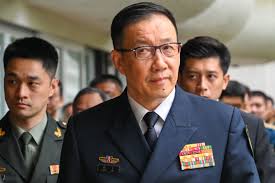As US and China defence chiefs meet in Singapore, attention turns to rising tensions over the future of Taiwan. Defence chiefs from around the Asia-Pacific are in Singapore to discuss security challenges facing the region. The three-day summit, known as the Shangri-La Dialogue, attracts high-level ministers, military heads, and global security analysts.
Understanding the Shangri-La Dialogue
What is the Shangri-La Dialogue?
The Shangri-La Dialogue is an annual intergovernmental security forum held by the International Institute for Strategic Studies (IISS) in Singapore. It serves as a platform for defence ministers, military chiefs, and security experts from around the world to discuss pressing security issues in the Asia-Pacific region.
Significance of the Dialogue
The dialogue is crucial for fostering mutual understanding and cooperation among nations. It allows for open discussions on regional security, facilitating diplomatic engagement and collaborative problem-solving.
US-China Relations: A Central Focus
Historical Context
The relationship between the US and China has been marked by both cooperation and conflict. In recent years, tensions have escalated over issues such as trade, technology, and territorial disputes, with Taiwan being a particularly contentious point.
Current Tensions Over Taiwan
Taiwan remains one of the most sensitive issues in US-China relations. China’s insistence on reunification with Taiwan and the US’s commitment to Taiwan’s defense have led to a precarious situation. Recent military maneuvers and rhetoric have only heightened these tensions.
Key Discussions at the Shangri-La Dialogue
Military Cooperation and Competition
At the summit, military cooperation and competition between the US and China are expected to dominate discussions. Both nations are keen to assert their influence in the region, with the South China Sea and Taiwan as key focal points.
Security Challenges in the Asia-Pacific
Regional security challenges, such as North Korea’s nuclear program, maritime security, and cybersecurity, will also be significant topics. The dialogue provides an opportunity for nations to align their strategies and collaborate on common threats.
Impact on Regional Security
Reactions from Regional Powers
Countries in the Asia-Pacific region are closely monitoring the US-China interactions. Nations like Japan, South Korea, and Australia have vested interests in the stability of the region and are likely to voice their perspectives on the matter.
Potential Outcomes
The dialogue could lead to either a reduction in tensions or a hardening of positions. Diplomatic efforts and back-channel negotiations will play crucial roles in shaping the outcomes of these high-stakes discussions.
The Role of Defence Chiefs
US Defence Secretary’s Objectives
The US Defence Secretary aims to reassure allies, deter Chinese aggression, and promote a rules-based international order. By engaging with regional partners, the US seeks to strengthen its security alliances and partnerships.
Chinese Defence Minister’s Goals
The Chinese Defence Minister’s primary goal is to assert China’s sovereignty claims, especially regarding Taiwan and the South China Sea. China will also aim to counter US influence and build support for its vision of regional security.
Strategic Importance of Taiwan
Taiwan’s Geopolitical Significance
Taiwan is strategically located in the East China Sea, making it a crucial point for military and economic control. Its position makes it a key player in regional security dynamics and a point of contention between major powers.
US-Taiwan Relations
The US maintains unofficial relations with Taiwan, providing military support and advocating for its international participation. This relationship is a cornerstone of US strategy in the Asia-Pacific, aimed at countering Chinese influence.
Economic Implications of the Tensions
Trade and Commerce
Rising tensions over Taiwan could disrupt trade and economic stability in the region. The Asia-Pacific is a critical hub for global commerce, and any conflict would have widespread economic repercussions.
Technology and Innovation
Both the US and China are investing heavily in technological advancements. Cooperation or conflict in this area will significantly impact global innovation and economic growth.
Diplomatic Efforts and Resolutions
Negotiation Channels
Diplomatic channels remain open, with both nations expressing willingness to engage in dialogue. The Shangri-La Dialogue provides an essential forum for these discussions, promoting peace and stability.
Role of International Organizations
Organizations like the United Nations and ASEAN play pivotal roles in mediating disputes and fostering cooperation. Their involvement can help de-escalate tensions and build a framework for long-term peace.
Public Perception and Media Influence
Media Coverage
Media coverage of the summit and the US-China interactions will shape public perception. Balanced reporting is crucial to ensure a comprehensive understanding of the issues at hand.
Public Opinion
Public opinion in both the US and China can influence policy decisions. Understanding and addressing the concerns of the populace is vital for both governments.
Military Strategies and Readiness
US Military Presence in Asia
The US maintains a significant military presence in Asia, with bases in Japan, South Korea, and the Philippines. This presence is a deterrent to aggression and a reassurance to allies.
Chinese Military Advancements
China has been rapidly modernizing its military, focusing on technology and capabilities to project power. This modernization is a central aspect of China’s strategy to challenge US dominance in the region.
Potential Scenarios and Outcomes
Scenario Analysis
Several scenarios could unfold from the current tensions, ranging from diplomatic resolutions to increased military confrontations. Each scenario has distinct implications for regional and global security.
Long-term Implications
The long-term implications of US-China tensions over Taiwan will shape the strategic landscape of the Asia-Pacific. A stable and peaceful resolution is crucial for the prosperity of the region.
Navigating a Complex Future
The Shangri-La Dialogue serves as a critical platform for addressing the rising tensions between the US and China over Taiwan. The discussions and engagements at the summit will influence the future of regional security and stability. As defence chiefs meet and strategize, the world watches closely, hoping for a peaceful and cooperative resolution to the complex challenges facing the Asia-Pacific.




